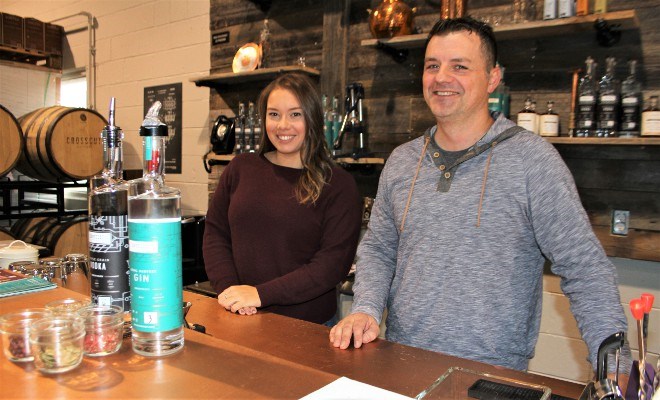Making spirits has been a daydream of Shane Prodan's for years.
After dealing with marketing, regulations and sourcing ingredients, he says the reaction from the public after opening Sudbury's first distillery has been a pleasant surprise.
His venture, Crosscut Distillery, opened its doors April 4 in an industrial park in the city's south end.
The first few months have been one long experiment in different formulas, gauging public opinion and keeping up with demand.
“It may sound corny, but the reaction we've been getting has been heartwarming,” he said in an interview. “The alcohol manufacturing industry is one of the most heavily regulated, next to the oil industry. The first year is not exciting, but the passion keeps us going.”
The distillery is the first in the city and one of the few in the province classified as a grains-to-glass establishment. All their alcohol is produced on the premises, with most of their grains and botanicals coming from local growers.
Recently, LCBO locations in Sudbury have been carrying their product. This is a huge milestone Prodan has been working towards since the beginning, he said, as it means consumers can find their product in other locations besides the distillery.
Some ingredients, especially those found in gin, are not available in Canada and have to be shipped.
The spent grains and botanicals go back to the farms for compost and fertilizer.
The name "Crosscut" is a play on words and a nod to the region's mining and forestry heritage. A crosscut is a diagonal cut across the main grain or axis of wood or stone.
Even the bottle is designed to mimic a crosscut.
It's tougher creating a local product, especially with Northern Ontario having fewer farms to draw from as opposed to southern distilleries, but it's a passion Prodan's had since he decided to return to the North two and a half years ago.
“My wife has family in Elliot Lake and Sudbury, and we wanted to be closer to family while planning this,” he said.
During the planning phases, they were not looking at being in an industrial park. The location has some challenges, but it is proving to be a great fit. They are located across the street from Stack Brewing, surrounded by industrial services, a short walk from a residential neighbourhood, and next to a major roadway.
“We've forged a friendly relationship with the people at Stack. They've been helpful with tips and insight into festivals and markets we could get into, as well as help with joint tours,” said marketing and events coordinator Sarah Del Monte.
“We have had several groups come in for tours and tastings. I had a lady come in and say it's great the distillery is here because she can walk from her home.”
Crosscut is split into two sections: the distillery, and a tasting room and retail space. Prodan said the tasting room is quickly becoming a popular spot for people wanting to sample their product and experiment with cocktails.
The cocktail culture is experiencing a resurgence after about a decade of microbreweries dominating the scene, he said. All of Crosscut's products are designed to be used in mixes.
“These are not like the old vodkas and gins our grandparents used,” he said. “The old gins and vodkas didn't have that flavour profile modern spirits have. People want to try new flavours.”
Before Crosscut, Prodan was living in Ottawa as a toxicologist working on food safety policies. His background in science has been helpful in understanding the chemistry of the spirits, as well as the biology of the effects on people.
As he looked into the growing brewing and distilling industry, he decided his background in science and working with government agencies would fit well. He still had a lot of work to do, which included taking courses and getting certifications, as well as planning his first products to produce.
“To be a distiller, you have to think like a forager,” he said. “We learned a lot about seasonal availability, storing, and experimenting with flavours and combinations.”
The exact combinations he uses are a trade secret, but he does show off some common ingredients to the public, such as juniper berries, rosehips and sumac.
“There are basic formulas, but every distiller wants to be unique,” Prodan said. “Gin, especially, has a lot of potential for flavour profiles never seen anywhere else.”
Crosscut's first product was a bacon-flavoured vodka, which Del Monte said was polarizing.
“People either loved it, or hated it, but it definitely got attention,” she said. “It did sell and since then, we've experimented with a few other seasonal offerings like the haskap and rhubarb gin.”
In the slower times, the company has found success experimenting with other grains, such as a corn gin that proved so popular they had two runs and will do another.
Prodan said they will be releasing more seasonal products.




